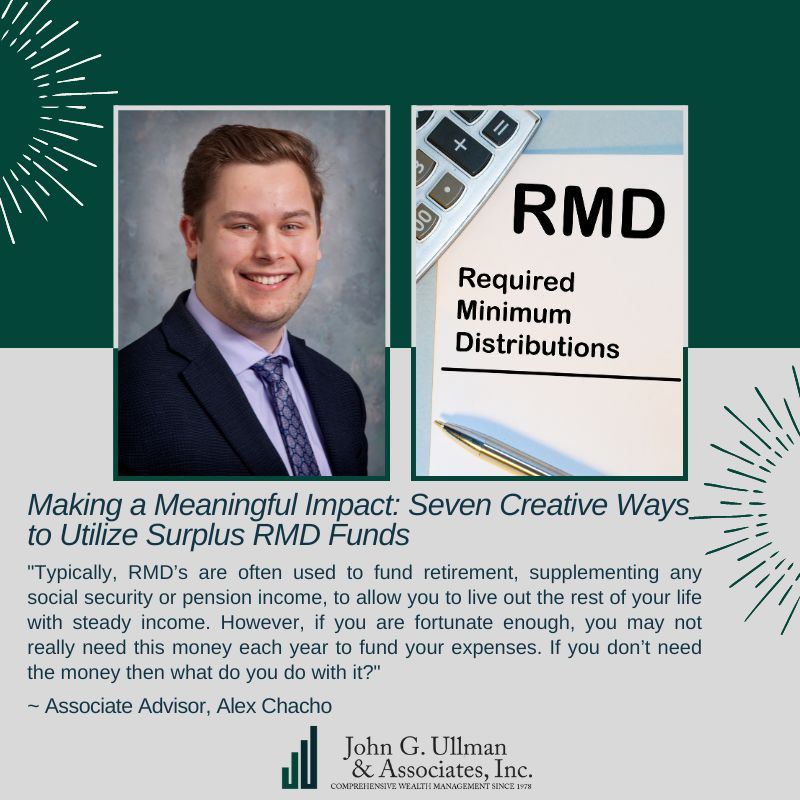There comes a time when everyone who has a tax advantaged account such as an IRA or 401(k), will have to begin Required Minimum Distributions (RMD’s). In 2023, if you are 73, you will be required to withdraw a certain amount of money from your IRA each year. The idea behind this, is that IRA’s allow people to set aside pre-tax money throughout their life and save for retirement. This prompts you to slowly pay the taxes owed on money that has since grown tax free.
Typically, RMD’s are often used to fund retirement, supplementing any social security or pension income, to allow you to live out the rest of your life with steady income. However, if you are fortunate enough, you may not really need this money each year to fund your expenses. If you don’t need the money then what do you do with it?
Charitable Contributions
One of the most fulfilling ways to utilize surplus RMD funds is by donating to charitable organizations and causes you are passionate about. A Qualified Charitable Donation (or QCD for short) can be made directly from your IRA and count towards your RMD. These contributions can be made up to an annual limit of $100,000 and as long as you are at least 70 ½ years old. Also, any amount made for the QCD will also not be taxable! By giving back to the community, you can leave a positive legacy and create a lasting impact on the lives of others, while also finding some tax savings along the way.
Establish or Fund a Donor-Advised Fund (DAF)
If you want to make a long-term impact but haven’t decided on specific charities yet, consider establishing or contributing to a Donor-Advised Fund (DAF). A DAF allows you to make a lump-sum contribution, take an immediate tax deduction, and then distribute the funds to various charitable organizations over time. This strategy allows you to carefully plan your charitable giving while potentially benefiting from tax advantages. Keep in mind that the charity of choice needs to be a public 501(c)(3) nonprofit organization in order to qualify. If you are unsure, reach out to a financial professional who can help verify for you.
Support Your Family and Loved Ones
While you may not need the RMD funds to cover your own expenses, you can use the money to support your family and loved ones. Consider funding your grandchildren’s education savings accounts, gifting financial assistance to your children for their home purchase, or helping family members in need. These gestures can create a positive impact on the financial well-being of your loved ones and foster stronger family bonds.
Boost Your Investment Portfolio
A common misconception is that when the money is withdrawn, you have to spend it. While you do have to take the money out of your IRA, and you can’t put it back in, you can simply reinvest the money in other accounts. Whether you have a financial advisor who helps invest your money, or if you have your own self-managed investment accounts, there is nothing stopping you from putting the same money, after taxes of course, into your investment account.
Establish a Scholarship Fund
If you are passionate about education, consider creating a scholarship fund to support deserving students in their pursuit of higher education. Your surplus RMD can be the foundation for this scholarship fund, helping students achieve their dreams and aspirations while leaving a lasting impact on their lives.
Patronize the Arts
If you have a strong affinity for the arts, consider supporting local artists, art galleries, or cultural institutions with your surplus RMD. By patronizing the arts, you play a crucial role in fostering creativity and preserving cultural heritage for future generations.
Environmental Conservation
If you are concerned about the environment and wildlife conservation, use your surplus RMD to support environmental organizations. These funds can aid in preserving natural habitats, supporting sustainable practices, and protecting endangered species.
Your Required Minimum Distribution can be more than just a mandatory withdrawal. By thoughtfully and intentionally channeling surplus RMD funds towards charitable causes, your family, or investment opportunities, you have the power to make a profound and positive impact on the world around you. One final tip, try to have taxes withheld from your RMD when you make it. This way you don’t get surprised with a large tax bill the following tax season. Feel free to reach out to any advisor here at John Ullman & Associates if you have any questions or concerns regarding your RMD’s.


